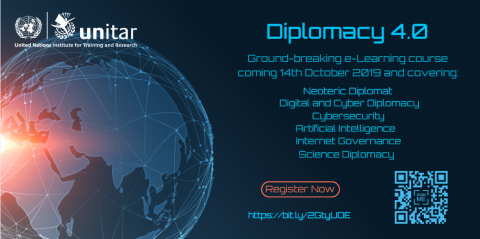
UNITAR Online Catalogue
Diplomacy 4.0 - Beyond the Digital Frontier

Multilateral Diplomacy
Antecedentes
Humankind is indisputably entering a new digital era. The impact of rapid technological and scientific advances on our professional and everyday lives is so great that World Economic Forum’s Professor Klaus Schwab termed this process as the Fourth Industrial Revolution. We are the witnesses of the transcendence through new frontiers.
These new frontiers go beyond traditional understanding of virtually every aspect of human activity. Unlike in the past, diplomacy and international affairs can no longer afford to slowly adapt to those changes as their pace demands almost business-like agility to stay abreast and relevant.
Diplomacy 4.0 is UNITAR’s answer to these new challenges. The concept explores the nexus between diplomacy and areas of artificial intelligence, cybersecurity, scientific advancements, digitalisation, internet governance and other significant frontier issues, thus paving the way for the next generation of international affairs professionals.
Objetivos del evento
Building up on the Diplomacy 4.0 concept, UNITAR designed its first ever comprehensive e-learning course tackling most pressing issues at the intersection of diplomacy and ICT. The programme will provide its participants not only with theoretical knowledge but also practical skills on how to implement best practices.
Its overarching purpose is to prepare the involved actors for the continuously deepening interdependence between traditional diplomacy and contemporary technology and equip them with necessary skills to excersise those innovations in practice. The programme further intends to raise awareness about Diplomacy 4.0 in the international community, thus stimulating modernisation of diplomatic practices, procedures and dynamics.
Last but not least, it aspires to build up a knowledge hub, bringing subject matter experts and policy-practitioners together to form community discussing latest developments in the field and producing practical solutions. This will be done through the UNITAR alumni platform, in which a separate chapter for all participants worldwide will be established.
Contenido y estructura
In our rapidly changing world, diplomats and governments can no longer afford to stay behind. The first edition of the e-Learning course on Diplomacy 4.0 will provide them with competitive edge and all necessary knowledge to effectively navigate the cross-section of diplomacy and digital technology.
The e-Learning course serves the purpose of providing a broad overview on Diplomacy 4.0 and thereby preparing the participants for the challenges and opportunities in this field. It is 6 weeks of length and the materials will be made available on UNITAR’s e-Learning platform.
The course’s required reading material will be supported by multimedia items, assessment quizzes, and a wealth of other information. It will also feature discussion boards, which are facilitated by moderators with broad experience in the field. The course will contain the following modules:
- Module 1.0. - The Neoteric Diplomat
- Module 2.0. - Digital Diplomacy
- Module 3.0. - Cybersecurity
- Module 4.0. - Artificial Intelligence
- Module 5.0. - Internet Governance
- Module 6.0. - Science Diplomacy
Público objetivo
The first edition of the e-Learning course on the Diplomacy 4.0 is aimed at introducing the concept to the wider public and raising awareness of the present and upcoming related challenges and opportunities facing diplomats and international affairs professionals.
For this reason, the Diplomacy 4.0 e-Learning course is primarily geared towards diplomats and foreign ministry officials. These can also include other government officials and participants from the broader diplomatic community, including private sector, civil society and academia.
In order to stay abreast of the quickly changing landscape, each edition of the course will be evaluated and adapted to the newest developments in the field. In the long run, the course will also be complemented by high-level panels, interactive discussions and a master’s degree.